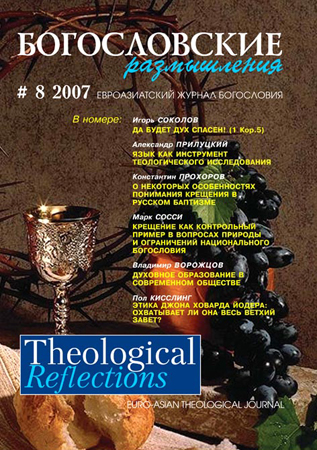Theological Education in Modern Society
Keywords:
Богословское образованиеAbstract
The church and society are two opposite values, trying mutually to influence one another. In the development of church and society the law of “challenge answer” is valid. Spiritual education is an instrument, which allows the church to give an adequate answer to the challenge of the society and current times. This paper is about the particularities and challenges of the theological education in Russia. At the same time the subject under discussion in the article is relevant worldwide.
References
- Alekseev, V. P. and A. V. Panin, comp. Khrestomatiia po filosofii. Moscow, 1997.
- de Chardin, Teillhard. Fenomen cheloveka. Moscow: Nauka, 1987.
- Gomperz, Theodore. Grecheskie mysliteli, vol. 1. St. Petersburg: Aleteyia. Gubskiy, E. M., ed. Filosofskiy entsiklopedicheskiy slovar’. Moscow: Infa-M, 1999.
- Hegel, G. W. F. Nauka logiki. Moscow: Mysl’, 1998.
- Kuhn, Thomas. Struktura nauchnykh revoliutsiy. Moscow: ACT, 2004.
- Posnov, M. E. Istoriia khristianskoy tserkvi: Do razdeleniia Tserkvi—1054 god. Moscow: Vyshaia shkola, 2005.
- Skirrbek, G. and N. Gil’e. Istoriia filosofiia: Uchebnoe posobie dlia vuzov. Moscow: Vlados, 2000.
- Toynbee, Arnold. Postizhenie istorii. Moscow: Ayris-Press, 2002.
Downloads
How to Cite
Issue
Section
License
Copyright (c) 2020 Vladimir VOROZHTSOV

This work is licensed under a Creative Commons Attribution-NonCommercial 4.0 International License.
All articles published in the Journal are distributed under a Creative Commons Attribution-NonCommercial 4.0 International License
By submitting an article for publication in Theological Reflections: Eastern European Journal of Theology the author grants the editors the right to publish the article and distribute it in electronic and print form.
The author reserves all copyrights and the right to use the materials of the article in whole or in part for educational purposes, to write his own dissertations, to prepare abstracts, conference reports, oral presentations, etc., as well as post electronic copies of articles (including the final electronic version downloaded from the journal’s official website) on non-commercial web-resources without the consent of the editorial board and founders.



